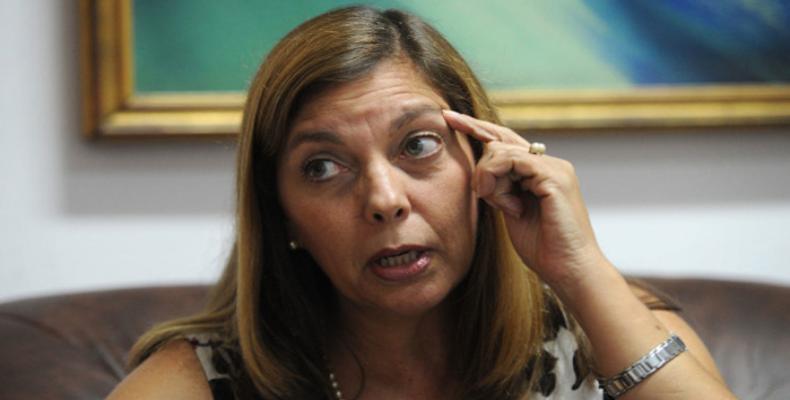Havana, December 17 (RHC-PL) -- Cuba and the United States made significant progress during 2015, despite the continuing economic blockade of the island, according to Josefina Vidal, the director of the U.S. Department of the Cuban Foreign Ministry.
The restoration of diplomatic relations and opening of embassies are among the most important steps, following the announcement of President Raul Castro and his U.S. counterpart, Barack Obama, on December 17th last year on the decision to change the course of bilateral ties.
The exclusion of Cuba from the list of countries Washington says sponsor terrorism, the meetings of the leaders of the two countries as well as Foreign Minister Bruno Rodriguez and U.S. Secretary of State John Kerry were other key moments in the new stage between the two neighboring nations, added the Cuban official.
Regarding President Obama's recent statements about his intentions to visit Cuba in the future, Vidal said the U.S. president will always be welcome on the Caribbean island, in the same way as other distinguished dignitaries from many countries are received.
Vidal referred to the increase in high-level exchanges that continued in recent months, both the U.S. Congress, as ministers and secretaries of the two governments, in addition to progress in cooperation in aviation and maritime security, combating drug trafficking and immigration.
She reported that the December 14th to 16th talks between the two parties took place in Washington DC, on civil aviation. She said that an agreement in this area is possible within a short time, and afterwards will also assess the immediate plans for restoring direct mail services.
She added that contacts are maintained, in terms of environmental protection, compliance and enforcement, and cooperation on health issues, and have begun dialogue on climate change, trade-offs, and even human rights. In this last aspect, the two sides, she said, have deep differences.
Vidal contrasted these advances in the political-diplomatic level with the little that has been achieved in economic-commercial aspects, in particular the continuing of the main obstacle to normalization of bilateral ties: the economic, commercial and financial blockade against the island since more than five decades.
In this regard, she said that President Obama has broad authority, without Congress, to eliminate a substantial part of restrictions that impede the realization of their own measures announced in January and September this year by the Departments of Treasury and Commerce.
Among the privileges the president has are the possibility of allowing Cuba the use of the U.S. dollar in international transactions and access to the Caribbean nation to credit for purchases in a wide range of sectors of the U.S. economy.
She further reiterated that the return of the territory occupied by the Guantanamo Naval Base, the cessation of illegal radio and television, as well as the abandonment of intentions to subvert the internal order of Cuba are also deemed necessary by Cuban authorities in order to normalize relations with Washington.
She recalled that for the Cuban government, another vital issue is the need for the U.S. Congress to repeal the so-called Cuban Adjustment Act, in force since 1966, which encourages illegal immigration by any possible means.
Havana also calls on Washington to eliminate the “wet feet, dry feet policy,” which welcomes Cubans who touch U.S. soil and returns to the island those who are picked up at sea before arriving in the United States.
All this is part of outdated policies, which are not in line with the will of both governments to move forward and build a new relationship for the good of the peoples of the two nations, said Vidal.
However, these contradictions do not prevent both sides living peacefully in an environment of civilized coexistence based on mutual respect and reciprocity, the environment in which the contacts and negotiations in recent months took place, she concluded.
On July 20, 2015, Cuba and the United States restored diplomatic relations and the Interests Sections in their respective capitals became embassies, which, according to the Cuban government, meant the conclusion of the first stage and in turn ushered in a long process towards normalization of bilateral ties.


